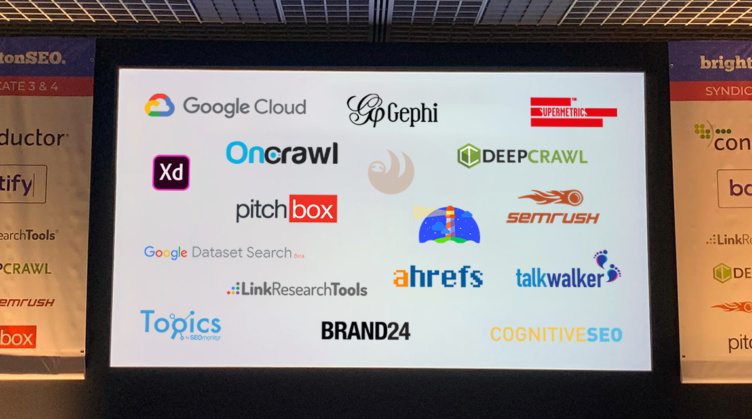
As an SEO or digital marketer, you will know tools are indispensable. The best ones save you time, money, and make life a whole lot easier. After covering all 87 talks at BrightonSEO, we were in the lucky position to hear recommendations for lots of great tools, apps, and software. In no particular order, here’s a selection of the ones that caught our eye the most:
Google’s Natural Language API demo
In Google’s words, the Natural Langauge API uses machine learning to reveal the structure and meaning of text. As Mark Osborne said in his The Seedy Underbelly of Keyword Research and Search Intent talk, “It’s really great if you’re writing a piece and you want to know what Google thinks of that piece and how it categorizes it: you can put it in this tool and it will show you how it categorizes it.”
Try the Natural Language API demo.
Adobe XD
Traditional website wireframing is ineffective because those early skeletons don’t resemble the final designs. In his Perfect Outcomes: Create Amazing Websites 10x Faster With Rapid Prototyping talk, Justin Taylor described how Adobe XD allows you to create a representative wireframe in much less time. Clients end up happier because they get to see what things will actually look like, changes can be made rapidly, and the comprehensive prototypes can more easily be adapted to functional websites.
OnCrawl
According to François Goube’s talk, any SEO who wants to achieve deliverable, repeatable and sensible results needs a firm understanding of the environment they’re operating in. Specialising in crawl analysis. OnCrawl is an award-winning tool that provides a comprehensive look at your website’s technical SEO.
DeepCrawl
DeepCrawl is a tool that’s always mentioned at BrightonSEO, and for good reason (we’re big fans here at Seeker). DeepCrawl is more than a simple website crawler: this tool does a lot of the heavy lifting for you when it comes to SEO. This crawler will analyse your website architecture and highlight technical issues that can be actioned to improve organic performance. It’s very handy when you need some quick wins to impress a new client.
SEMrush
SEMrush is typically a BrightonSEO sponsor, and its stand always gets plenty of attention during the event, especially when the SEO-themed beverages start getting handed out! The tool itself is a big name in SEO. It’s an all-in-one system that analyses organic rankings, backlink profiles, anchor texts and much much more. There’s not much that SEMrush can’t do.
Ahrefs
Another big name in the industry, and a tool that gets multiple mentions at every BrightonSEO, Ahrefs is the #1 tool for backlink analysis. The Ahrefs crawler actually processes up to 5 billion pages a day! Of course, Ahrefs is much more than a backlink analysis tool. It’s similar to SEMrush in being a multi-functioning SEO powerhouse, and can also do things like monitor the organic keywords/traffic of any site, analyse anchor texts, and discover content.
LinkResearchTools
LRT is a popular BrightonSEO sponsor, and the man behind the tool, Christoph C. Cemper, was actually a headline speaker at April’s conference. The tool itself is probably the most detailed and feature-rich backlink tool on the market. What makes LRT so great is its ability to analyse link quality and easily identify toxic links in your backlink profile. The team behind the tool also provides lots of training to help users get maximum value from their investment.
Pitchbox
Mentioned in more than one talk and a sponsor of the event, Pitchbox is an outreach and prospecting automation tool. It allows you to build relationships with bloggers, influencers and journalists on a massive scale. With intuitive keyword search features, customisable follow-up options, and access to lots of data, it significantly reduces the admin involved in managing outreach opportunities.
Google Dataset
Referenced by Kenichi Suzuki, Google Dataset is still in beta at the time of writing. The tool lets you find data sets from a publisher’s site, a digital library, or an author’s blog. Companies that commit to optimising their websites for search crawlers and new markup options — like those for Google Dataset — will increase their opportunities to appear more prominently on the web.
Find out more about Google Dataset.
Gephi
In his talk, Ways To Visualise Your Crawl Data, Anders Riise Koch explained how using visualisation tools is great for building a story around your data and helping a client understand your point. He cited Gephi as one of the most advanced data visualisation tools available. For beginners, Screaming Frog has its own in-built visualisation menu which can be used to more clearly present crawl data to clients.
Sloth
Nils De Moor explained how CDN edge servers can improve your SEO. For the uninitiated, a CDN server is a geographically-distributed group of servers that do not host your content but effectively cache certain elements like HTML and JavaScript. Working across the internet, this group of servers can significantly speed up your content delivery. Referenced by Nils De Moor, Sloth is a user interface for the Cloudflare CDN service that enables you to make changes to cached content more easily (and without accessing the code).
cognitiveSEO
Razvan Gavrilas of cognitiveSEO used his talk to show how thinking about search intent, filling content gaps and optimising your existing copy can build exponential SEO growth. His company’s tool is an all-in-one resource for auditing your website, performing keyword research, rank tracking, content optimisation, and more.
Supermetrics
Showcased by Sam Caesar, Supermetrics allows you to generate reports from disparate sets of data in seconds through gathering them in one Google Sheet. In his talk, Sam used this example: if you had a marketing campaign that used Facebook Advertising and Google Ads, you could use a simple spreadsheet as a simple hub, pulling through all the relevant data and displaying it however you liked. Custom designs, custom fields, your own data… happy days!
Find out more about Supermetrics.
Google Lighthouse
Highlighted by Marcus Tober of Searchmetrics, Google Lighthouse is an automated open-source tool that will help you improve your webpage. Feed Lighthouse a URL and it will return a report on how well that page performed against a wide range of key metrics, including accessibility and progressive web apps. From there, the tool also provides guidance on what you need to fix and how. Pretty nifty, hey?
Learn more about Google Lighthouse.
Google Search Console Fetch & Render Tool
In her talk, How to Repurpose Existing Content to Help your Strategy, Coral Luck raved about the usefulness of the fetch and render feature on Google’s Webmaster Tools. This tool allows you to tell the search engine’s web crawlers when to look at your page. When you submit a URL using this method, a Googlebot will crawl it within one day, which is particularly useful when you produce new content and you want to know if it’s been indexed without any issues.
Learn more about the Fetch and Render Tool.
Talkwalker and Brand24
Championed by Lukasz Zelezny, Talkwalker and Brand24 are two tools that you can use to track mentions of your brand name across the internet. If a blog or publication, for example, refers to your brand but does not add a link, you can send it a polite email asking that one be added. This is a simple way to build links naturally.
Try Talkwalker or Brand24.
Topics
A brand-new tool from SEOmonitor, Topics is a keyword research tool that curates all non-branded relevant keywords and groups them by searcher intent. There’s no need for extra spreadsheet work to filter your keywords, and it’s free, unrestricted, and updated every week.
That concludes our roundup for the best tools showcased at BrightonSEO in April 2019. The industry is always changing, and the next exciting development is always just around the corner. We can’t wait to go back in six months to discover more recommendations for tools that are sure to push SEO and digital marketing forward yet again.
